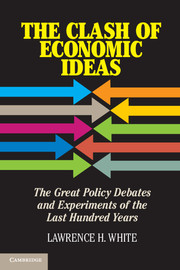Book contents
- Frontmatter
- Contents
- Figures
- Acknowledgments
- Introduction
- 1 The Turn Away from Laissez-Faire
- 2 The Bolshevik Revolution and the Socialist Calculation Debate
- 3 The Roaring Twenties and Austrian Business Cycle Theory
- 4 The New Deal and Institutionalist Economics
- 5 The Great Depression and Keynes’s General Theory
- 6 The Second World War and Hayek’s Road to Serfdom
- 7 Postwar British Socialism and the Fabian Society
- 8 The Mont Pelerin Society and the Rebirth of Smithian Economics
- 9 The Postwar German “Wonder Economy” and Ordoliberalism
- 10 Indian Planning and Development Economics
- 11 Bretton Woods and International Monetary Thought
- 12 The Great Inflation and Monetarism
- 13 The Growth of Government
- 14 Free Trade, Protectionism, and Trade Deficits
- 15 From Pleasant Deficit Spending to Unpleasant Sovereign Debt Crisis
- Index
- References
11 - Bretton Woods and International Monetary Thought
Published online by Cambridge University Press: 05 June 2012
- Frontmatter
- Contents
- Figures
- Acknowledgments
- Introduction
- 1 The Turn Away from Laissez-Faire
- 2 The Bolshevik Revolution and the Socialist Calculation Debate
- 3 The Roaring Twenties and Austrian Business Cycle Theory
- 4 The New Deal and Institutionalist Economics
- 5 The Great Depression and Keynes’s General Theory
- 6 The Second World War and Hayek’s Road to Serfdom
- 7 Postwar British Socialism and the Fabian Society
- 8 The Mont Pelerin Society and the Rebirth of Smithian Economics
- 9 The Postwar German “Wonder Economy” and Ordoliberalism
- 10 Indian Planning and Development Economics
- 11 Bretton Woods and International Monetary Thought
- 12 The Great Inflation and Monetarism
- 13 The Growth of Government
- 14 Free Trade, Protectionism, and Trade Deficits
- 15 From Pleasant Deficit Spending to Unpleasant Sovereign Debt Crisis
- Index
- References
Summary
At 3:00 p.m. on 6 July 1944, John Maynard Keynes joined Harry Dexter White for White’s daily press briefing at the Hotel Washington in Bretton Woods, New Hampshire. The grand old hotel was the site of a forty-four-nation conference that was cobbling together a framework for the postwar international monetary system. Keynes had gone to Bretton Woods as chairman of the British government’s delegation. White headed the U.S. delegation. The assembled reporters were especially eager to hear Keynes, who was still an economic-policy rock star, world renowned and intellectually vigorous, although physically worn at age sixty-one. Having been granted a peerage in 1942, he was now Lord Keynes.
Before the First World War, under an international gold standard and a largely liberal trade regime, global commerce and investment had flourished. The 1920s and 1930s, by contrast, were chaotic. Adherence to the gold standard was spotty. National governments adopted mercantilist restrictions on trade and payments, triggering retaliations. Some economists called for ending the monetary chaos by restoring the classical gold standard– but not Keynes. As early as his Tract on Monetary Reform (1924) he had famously written that “the gold standard is already a barbarous relic.” In place of the gold standard Keynes favored a fiat standard “so regulated as to maintain stability in an index number of prices.” In contrast to Hayek and others who viewed the gold standard as an evolved constitutional system that usefully constrained monetary policy, Keynes at the Bretton Woods press briefing likened it to an unconstrained dictator. The gold standard, he told the reporters, should not again exercise “tyrannical powers over the world.” The work of the conference was to limit gold to the role of “a monarch subject to constitutional limitations.”
- Type
- Chapter
- Information
- The Clash of Economic IdeasThe Great Policy Debates and Experiments of the Last Hundred Years, pp. 275 - 305Publisher: Cambridge University PressPrint publication year: 2012



